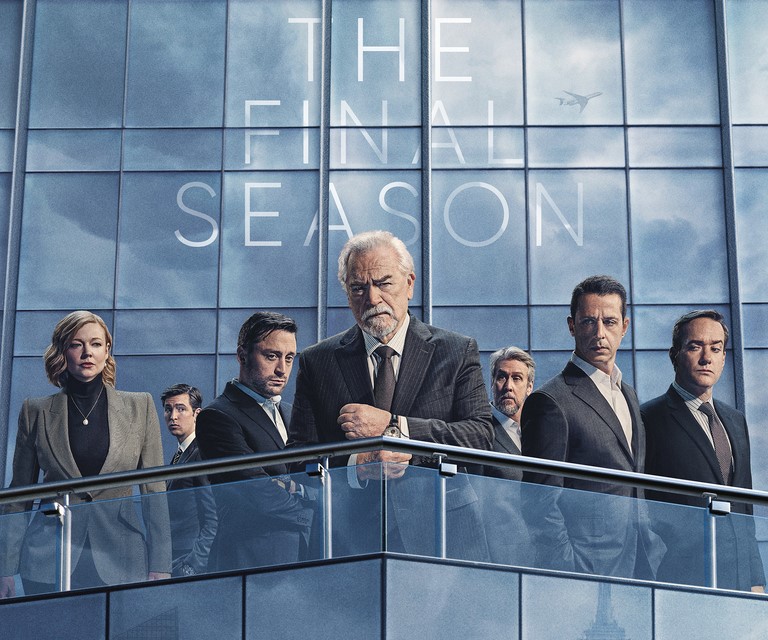MoneyWeek TV and book review of the year
Our favourite books, films and TV shows of the year. What we read and watched in 2023.

Get the latest financial news, insights and expert analysis from our award-winning MoneyWeek team, to help you understand what really matters when it comes to your finances.
You are now subscribed
Your newsletter sign-up was successful
Want to add more newsletters?
MoneyWeek takes a look at the TV shows, books and films that have made the biggest splash this year, from an all-action show covering the Brink’s-Mat gold robbery to plays that question the lack of business accountability and political ethics in the aftermath of the Grenfell tragedy and the ultimate business biography, Elon Musk by Walter Isaacson. Read our round-up of the year in culture.
Event of the year

Succession (HBO, Sky Atlantic)
It’s impossible to discuss the cultural events of 2023 without mentioning the fourth and final season of Succession. Even before the concluding episode, the death of a major character made headlines around the world – the Los Angeles Times even ran a mock obituary.
The show was developed by Jesse Armstrong – who had previous hits to his name including Peep Show, and Fresh Meat, and had contributed to The Thick of It. It charted the feuds among members of the fictional Roy family for control of the media conglomerate Waystar Royco (the inspiration was, reportedly, the Murdochs).
Try 6 free issues of MoneyWeek today
Get unparalleled financial insight, analysis and expert opinion you can profit from.

Sign up to Money Morning
Don't miss the latest investment and personal finances news, market analysis, plus money-saving tips with our free twice-daily newsletter
Don't miss the latest investment and personal finances news, market analysis, plus money-saving tips with our free twice-daily newsletter
At the beginning of the final series, the three main siblings, Kendall (Jeremy Strong), Roman (Kieran Culkin) and Shiv (Sarah Snook), seem to have accepted that the family firm will be sold by their father Logan (Brian Cox) to GoJo, run by Swedish tech tycoon Lukas Matsson (Alexander Skarsgård). However, when tragedy changes everything, they abandon plans to move on with their own venture in favour of a power struggle to either block the deal or grab the crown themselves.
All this takes place against the political turmoil of a contentious presidential election that comes down to a dramatic conclusion.
One of the joys of watching Succession has been seeing it evolve from slapstick comedy in the opening episodes to a more sophisticated operatic drama as the story progresses. The dark humour, however, remained a constant. Whether they are selling their inheritance for a mid-ranking corporate job, or betraying their spouses and turning on their families, the characters exhibit a compulsive tendency to self-sabotage. The final series is no different, and just when you think they are about to win a moral triumph or exhibit some self-awareness, they manage to throw it away, sometimes in the course of an evening. The quality of the acting and writing is so good that this moral bleakness ends up being compulsive viewing.
The show will be sorely missed.
Best films and TV
There has been an explosion in the number of documentaries and films about business and finance recently – not to mention the hit drama series Succession.
Big Vape: The Rise And Fall Of Juul (Netflix)
The Netflix series Big Vape: The Rise And Fall Of Juul was one of the most memorable. Over the four hours of running time, it tells the story of how a startup designed to wean people off cigarettes, by providing a safer alternative that would satisfy users’ cravings, soared to a multibillion-dollar valuation before imploding over concerns that it was causing a generation of teenagers to become addicted to its product. The documentary makers took the trouble to speak to people from all sides of the argument, including those who say that, by getting many smokers to quit cigarettes, Juul was a force for good. The overall thrust of the series is that Juul doomed itself the moment it took the easy option in pursuit of short-term gain by targeting young people, ignoring repeated warnings about the attractiveness of its flavoured pods to children and accepting money from cigarette companies. Big Vape is an entertaining and well-produced mini-series that raises important questions about business ethics and public-health policy.
The Gold (BBC)
No heist has captured the British public’s imagination more than the theft of £26m (£163m in today’s money) worth of gold bars from the Brink’s-Mat warehouse in 1983. The six-part BBC series The Gold, tells the tale of the battle between the police and the robbers to find the gold before it could be laundered. The central message – that both the crooks and the police were fighting a class-bound system – is a little ham-fisted, but the series does a fine job of maintaining the tension of the chase, despite the inevitability of the outcome. Hugh Bonneville delivers a particularly striking performance as the gritty, determined police inspector.
Best business books
Elon Musk, Walter Isaacson
Whether he’s fighting with advertisers, scrapping with regulators, or responding to a suggestion that he buy up Twitter by replying “How much is it?”, Elon Musk is rarely out of the news.
Elon Musk by Walter Isaacson outlines the life story of the controversial tycoon, both in terms of business successes and failures, and his often chaotic personal life. Starting with his childhood in South Africa, Isaacson goes on to look at Musk’s early business ventures, including Zip and PayPal. He continues through to his more recent involvement with Twitter/X, and his various technology projects, including those related to artificial intelligence and space travel.
Given that a large part of the book is based on his time shadowing Musk, it’s not surprising Isaacson decides that Musk is more of a visionary than a charlatan or monster. But the author is not afraid to highlight the ugly side of Musk’s hard-driving philosophy, as shown by the interviews with the many people who have fallen out with the Tesla leader. The book also contains some useful management lessons.
Whether you agree with Isaacson or are still a Musk sceptic, this well-written biography will make you think twice about the man with a mission to get us to Mars.
The Fund: Ray Dalio, Bridgewater Associates, and the Unraveling of a Wall Street Legend, Rob Copeland
A business guru who comes off less well is Ray Dalio, head of Bridgewater, the world’s largest hedge fund. The Fund: Ray Dalio, Bridgewater Associates, and the Unraveling of a Wall Street Legend, by Rob Copeland, acknowledges that Dalio may have been a great investor, but suggests he might have succeeded in spite of, not because of, his much-vaunted philosophy of “radical transparency”. The book is a powerful reminder that we might need to be a bit more sceptical of our investment and management gurus.
Best investment books
Picking your own shares, as opposed to an index fund or a handful of investment trusts, is not for the faint of heart. Even for those who have lots of time on their hands, there is a limit to the number of companies you can research in detail, which means that you need to find a way of narrowing the list of potential buys down.
Four Ways to Beat the Market, Algy Hall
Four Ways to Beat the Market by Algy Hall looks at four strategies based on quality (fast-growing firms with a high return on capital), value (firms trading on a low-earnings multiple), momentum (those whose share price and earnings are soaring) and income.
The great thing about this book is that Hall not only explains the rationale behind these strategies but also gives detailed practical advice about what to look for. Of course, just because a strategy has been successful in the recent past, doesn’t mean that it will work in today’s environment, especially given the rise in interest rates. You will also need to do your own research. Still, this book will drastically cut down the amount of time needed to implement a stock-selection strategy, bringing the process within reach of many investors who wouldn’t otherwise have been able to pursue it.
The Naked Trader’s Book of Trading Strategies, Robbie Burns
Those who want to take an even more active approach to their investing and dabble in trading may enjoy The Naked Trader’s Book of Trading Strategies by successful private investor Robbie Burns, known for his The Naked Trader, which has now gone through five editions. His new book is a little more advanced, explaining his strategies in more depth.
We would recommend sharply limiting the amount that investors put into short-term share punts, but the book has some interesting ideas and is a useful insight into the world of a successful private investor.
Best politics books
Anansi’s Gold: The Man Who Swindled The World, Yepoka Yeebo
Anansi’s Gold, by Yepoka Yeebo, which covers the career of Ghanaian con man John Ackah Blay-Miezah, could easily have made it into the best business category as well as the best politics book. It tells the story of how Blay-Miezah conned millions from investors over decades on the promise that he would recover the large amounts of gold supposedly held in a trust fund set up by Kwame Nkrumah, Ghana’s first post-independence leader. Even long after Blay-Miezah’s death, some still believe that the gold is out there.
This is ultimately a story about how Ghana was let down, not only by the exploitation that took place under the British colonial administration but also by the corruption, repression and instability that took place after the British left. The book makes what would otherwise be a grim tale into a rollicking read, full of unintentional comedy, that warns about what can happen in societies operating without trust or basic institutional norms – something those in developed countries might well ponder given the current state of politics, especially in the US.
Politics On The Edge: A Memoir from Within, Rory Stewart
If last year saw the political death of Boris Johson, with his removal from Downing Street, then this year saw the burial of his career, following his forced resignation from parliament and tearful testimony before the Covid inquiry.
One person who isn’t surprised about the turn of events is Rory Stewart. In Politics On The Edge: A Memoir from Within, Stewart recounts his nine-year stint as a Tory MP, which saw him rise to become a cabinet minister and even a potential Conservative leader before losing the whip. In the book, Stewart is scathing about his colleagues and what he sees as the failure of the current Westminster system. Even if you don’t necessarily agree with everything he says, the book is certainly a candid and eye-opening read.
Best plays
The Grenfell tragedy of 2017 combined enough shocking incompetence, business chicanery and political buck-passing to fuel a generation of playwrights and, indeed, this year saw the arrival of two plays.

Grenfell: In the Words of Survivors, by Gillian Slovo
Grenfell: In the Words of Survivors by Gillian Slovo
Grenfell: In the Words of Survivors by Gillian Slovo ran at the National Theatre and was mainly based on interviews with those who lived in the tower. Most of the three-hour running time was spent narrating the events of the fateful night and examining the damning evidence of official and business incompetence. Overall, the script and the acting made the play a powerful and expertly staged reminder of an event that is in danger of fading from our memory, leaving the audience unsettled and angry at the fact that no one has yet been prosecuted for their role in the tragedy. The play is due to tour in New York in 2024, though I wouldn’t be surprised if it was also revived on the London stage or turned into a film or documentary.
System Failure – Scenes From the Inquiry, Richard Norton-Taylor & Nicholas Kent
System Failure by Richard Norton-Taylor with Nicholas Kent also used people’s actual words, this time mostly from testimony from the second part of the official inquiry. While this may seem a drier approach, it highlights the unwillingness of many of the key players to take responsibility in the aftermath of the disaster. It raises questions about business ethics, the way that we are governed and the human tendency to try to pass the buck.
This article was first published in MoneyWeek's magazine. Enjoy exclusive early access to news, opinion and analysis from our team of financial experts with a MoneyWeek subscription.
Get the latest financial news, insights and expert analysis from our award-winning MoneyWeek team, to help you understand what really matters when it comes to your finances.

-
 Could you get cheaper loans under ‘significant’ FCA credit proposals?
Could you get cheaper loans under ‘significant’ FCA credit proposals?The Financial Conduct Authority has launched a consultation which could lead to better access to credit for consumers and increase competition across the market, according to experts.
-
 8 of the best properties for sale with minstrels’ galleries
8 of the best properties for sale with minstrels’ galleriesThe best properties for sale with minstrels’ galleries – from a 15th-century house in Kent, to a four-storey house in Hampstead, comprising part of a converted, Grade II-listed former library
-
 8 of the best properties for sale with minstrels’ galleries
8 of the best properties for sale with minstrels’ galleriesThe best properties for sale with minstrels’ galleries – from a 15th-century house in Kent, to a four-storey house in Hampstead, comprising part of a converted, Grade II-listed former library
-
 The rare books which are selling for thousands
The rare books which are selling for thousandsRare books have been given a boost by the film Wuthering Heights. So how much are they really selling for?
-
 8 of the best properties for sale with beautiful kitchens
8 of the best properties for sale with beautiful kitchensThe best properties for sale with beautiful kitchens – from a Modernist house moments from the River Thames in Chiswick, to a 19th-century Italian house in Florence
-
 Review: Eliamos Villas Hotel & Spa – revel in the quiet madness of Kefalonia
Review: Eliamos Villas Hotel & Spa – revel in the quiet madness of KefaloniaTravel Eliamos Villas Hotel & Spa on the Greek island of Kefalonia is a restful sanctuary for the mind, body and soul
-
 Adventures in Saudi Arabia
Adventures in Saudi ArabiaTravel The kingdom of Saudi Arabia in the Middle East is rich in undiscovered natural beauty. Get there before everybody else does, says Merryn Somerset Webb
-
 Review: Constance Moofushi and Halaveli – respite in the Maldives
Review: Constance Moofushi and Halaveli – respite in the MaldivesTravel The Constance resorts of Moofushi and Halaveli on two idyllic islands in the Maldives offer two wonderful ways to unwind
-
 Affordable Art Fair: The art fair for beginners
Affordable Art Fair: The art fair for beginnersChris Carter talks to the Affordable Art Fair’s Hugo Barclay about how to start collecting art, the dos and don’ts, and more
-
 Review: Gundari, a luxury hotel in the Greek island of Folegandros
Review: Gundari, a luxury hotel in the Greek island of FolegandrosNicole García Mérida stayed at Gundari, a luxurious hotel on Folegandros, one of the lesser-known islands in the southern Cyclades in Greece